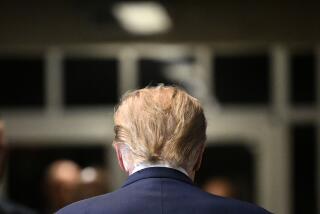Clinton campaign called too scripted
At a campaign stop in Newton, Iowa, last week, Sen. Hillary Rodham Clinton peered out at the crowd of 250 people and called on a 19-year-old college student, who posed a friendly question about global warming.
The Clinton campaign insists that the New York senator chose the student at random. If so, it turned out to be a fortuitous pick. Before the event began, a Clinton campaign aide had conferred privately with Grinnell College student Muriel Gallo-Chasanoff, opening a binder and showing her a typewritten list of questions she might pose. The sophomore selected one on global warming, and the aide assured her that Clinton would call on her when she raised her hand, according to an interview Gallo-Chasanoff gave to CNN.
So it went.
“I find as I travel around Iowa that it’s usually young people that ask me about global warming,” Clinton said.
No presidential campaign likes surprises, but Clinton’s operation may be unmatched in its discipline. The current front-runner for the Democratic nomination hews to her message and avoids messy campaign leaks and personnel drama. Still, by planting questions at what are supposed to be unscripted question-and-answer sessions with Iowa voters, Clinton may have fed perceptions that her campaign is too programmed for its own good, Democratic strategists said.
The episode followed a Democratic debate in Philadelphia where Clinton was widely faulted for offering ambiguous and perhaps overly calculated answers on Iraq, immigration and Social Security.
“It’s a small thing that could be a metaphor for a bigger concern for people -- over-management and too much caution,” said Robert M. Shrum, a senior advisor to the 2004 Democratic presidential nominee, Sen. John F. Kerry.
Clinton campaign spokesmen said the episode was an isolated one. An unnamed aide wanted Clinton to succeed and -- without the candidate’s knowledge -- veered from the campaign’s routine practice, they said.
“To my knowledge, this was something that just happened on this one occasion and is not something that will happen again,” said Mo Elleithee, senior spokesman for the campaign.
Another man describes a similar incident. Geoffrey Mitchell, a 32-year-old minister, said that at a Clinton appearance in Iowa in April a campaign aide suggested in the course of a conversation that he ask the candidate how she was “confronting” President Bush on Iraq.
Mitchell said he was uncomfortable posing that question and refused. In the end, Clinton took no questions, said Mitchell, who said he planned to vote for Sen. Barack Obama of Illinois in the Jan. 3 Democratic caucuses.
“There was no doubt in my mind that they were attempting to get me to ask a specific question that they wanted to talk about,” Mitchell said in an interview. “The tradition of the Iowa caucus is to just answer the questions of the people at the event, and it disappointed me that that was not taking place.”
Spontaneous exchanges with voters are a ritual in Iowa and New Hampshire, small states that pose the first tests for presidential candidates. Candidates are expected to take part in free-wheeling discussions about whatever may be on the voters’ minds. To the extent that a candidate short-circuits that process by stacking the audience with plants, it runs afoul of important political customs, political strategists said.
“This is all multiplied dramatically by the fact that Iowa and New Hampshire have this tradition of grass-roots politics, town hall meetings and house parties where everybody can have at it,” said Bill Carrick, a longtime Democratic consultant. “Then to say this is rigged -- that’s an attack on the Iowa and New Hampshire traditions.”
Spontaneous questions from the audience can be worrisome for Clinton’s campaign, which is bent on minimizing risks. She has had a few brushes with tough questions, some of which made unwelcome news.
In Iowa last month, Clinton sparred with a man about her vote for a resolution proclaiming the Iranian Revolutionary Guard a terrorist organization. He said he feared that the resolution would encourage Bush to take military action.
Clinton told him that “somebody obviously sent to you” a mistaken view of her position.
The man bristled and said he had done “my own research.”
Various campaigns complain that a certain kind of dirty trick routinely plays out on the trail -- having a rival’s supporters crash their town hall event and pose embarrassing questions.
Asked if this happens at former Massachusetts Gov. Mitt Romney’s events -- dubbed “Ask Mitt Anything” -- Kevin Madden, a spokesman for the GOP candidate, said: “Very much so.”
Another variation of this practice is typically seen with call-in radio and TV shows, said Chris Lehane, who was a spokesman for Al Gore’s unsuccessful campaign in 2000 and is now supporting Clinton. “There are very few phone calls that are genuinely from uninterested parties,” he said. “They’re generated from campaigns.”
More to Read
Get the L.A. Times Politics newsletter
Deeply reported insights into legislation, politics and policy from Sacramento, Washington and beyond. In your inbox three times per week.
You may occasionally receive promotional content from the Los Angeles Times.






